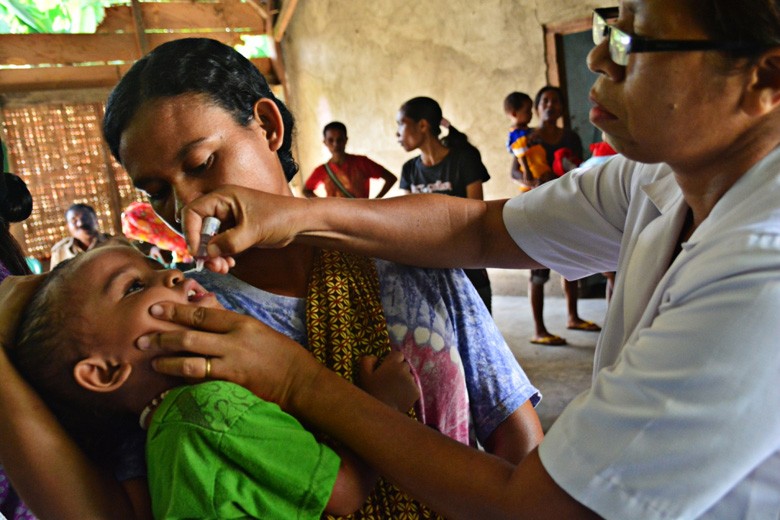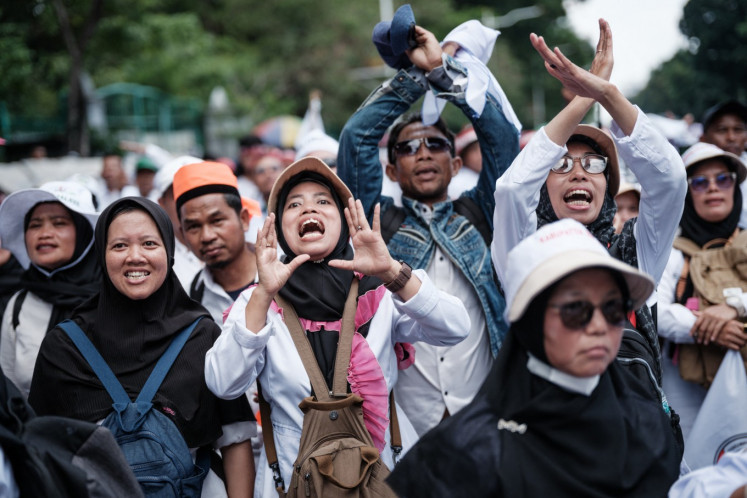Popular Reads
Top Results
Can't find what you're looking for?
View all search resultsPopular Reads
Top Results
Can't find what you're looking for?
View all search resultsLessons from UK-RI research collaboration
According to a survey in 15 districts/municipalities throughout six provinces, Sutmuller and Setiono ( 2011 ) found that the local health and education agencies were “more familiar with using data and were thirstiest for more data”, compared to other regional government working entities (SKPD).
Change text size
Gift Premium Articles
to Anyone
 For healthier children: A health official from the Waelengga community health center (Puskesmas) in Watunggene subdistrict, Kota Komba district, East Manggarai regency, Flores, East Nusa Tenggara, prepares a polio vaccine for a baby on the first day of national polio immunization week in March. (thejakartapost.com/Markus Makur)
For healthier children: A health official from the Waelengga community health center (Puskesmas) in Watunggene subdistrict, Kota Komba district, East Manggarai regency, Flores, East Nusa Tenggara, prepares a polio vaccine for a baby on the first day of national polio immunization week in March. (thejakartapost.com/Markus Makur)
F
or the first time since Indonesia has recorded health policies, the grand launch of the Evidence Summit on Maternal and Neonatal Mortality Project to reduce maternal and neonatal mortality in Indonesia took place on Aug. 18.
Led by the Indonesian Academy of Sciences (AIPI) together with USAID and URC’s Translating Research into Action (TRAction), the project aims to gather all existing evidence relevant to maternal and neonatal mortality in Indonesia, manage evidence in a framework that allows clear understanding of current evidence and prioritization for action and to build consensus among relevant stakeholders on the interpretation of existing evidence and priorities for action.
The evidence summit will culminate by February 2017, when a bibliography of evidence will be available to the public online, leaving only six months for the process of assembling available research and studies on what works and what does not work in tackling Indonesia’s maternal and neonatal mortality issues.
Time-wise, it is an ambitious project. However, this is a promising approach to mainstream evidence-based policies and programs. In addition, through the enormous grant provided by the Indonesian Science Fund (DIPI), research funding will no longer be an obstacle.
Yet, the use of data to establish policies and programs in Indonesia is still somewhat inconsistent and diverse from one sector to another.
According to a survey in 15 districts/municipalities throughout six provinces, Sutmuller and Setiono ( 2011 ) found that the local health and education agencies were “more familiar with using data and were thirstiest for more data”, compared to other regional government working entities (SKPD).
While data is crucial for informed decision-making, it is naïve to think that data is the only determinant in the decision-making process to establish a policy.
In fact, decision-making is influenced by many factors: the priorities of the local government; the relationship between the local government and other parties; the local leader’s vision and mission; and the regulations of the Finance Ministry, Home Ministry in the policy-making process with regard to resource or budget allocation. Indeed, research data is important but it still has to compete with other factors in shaping any policy or program.
For researchers, it is worth flagging that research evidence has been shown to be more likely to be taken up if it is co-constructed with actual users from the beginning.
A recent study on the use of mobile phone technology for nutrition service delivery through the community-based Posyandu system led by Dr. Inka Barnett from the Institute of Development Studies (IDS) from the UK together with Wahana Visi Indonesia and the Indonesian Health Ministry is a good example of this.
From the start of the study, researchers, implementers and the ministries worked together, with each contributing according to their roles and need for evidence.
The study was very successful as it provided valuable data and learning for all three parties. The mobile phone application is currently being rolled out to areas across Indonesia.
The real task now is to create demand for research and data from policymakers and those making decisions, not only for the health sector but also for broader sectors.
To do this, the most feasible next step for the Indonesian government is to develop a scheme whereby regular evaluation is conducted to examine how well the policies and programs have worked — not merely how well the budget has been used in any given program.
Highlighting Indonesia’s decentralized system, an incentive for the local governments also needs to be built to promote fair competition in making good policies and programs that actually work.
The lack of incentive for local governments to make evidence-based policies can result in low utilization of data as input for policies and programs.
Thus, when the impact of policies and programs receives deserved recognition, research evidence will be more desirable for both policymakers and program implementers.
***
Deviana Dewi works at the Centre for Indonesia’s Strategic Development Initiatives (CISDI), while Inka Barnett is a research fellow at the UK-based Institute of Development Studies. The opinions expressed are their own.
---------------
We are looking for information, opinions, and in-depth analysis from experts or scholars in a variety of fields. We choose articles based on facts or opinions about general news, as well as quality analysis and commentary about Indonesia or international events. Send your piece to community@jakpost.com. For more information click here.









